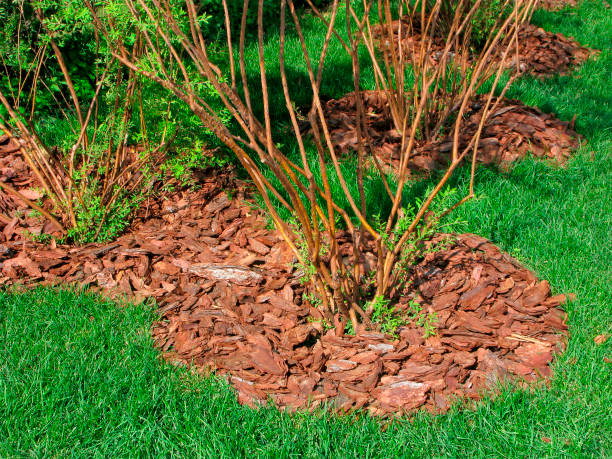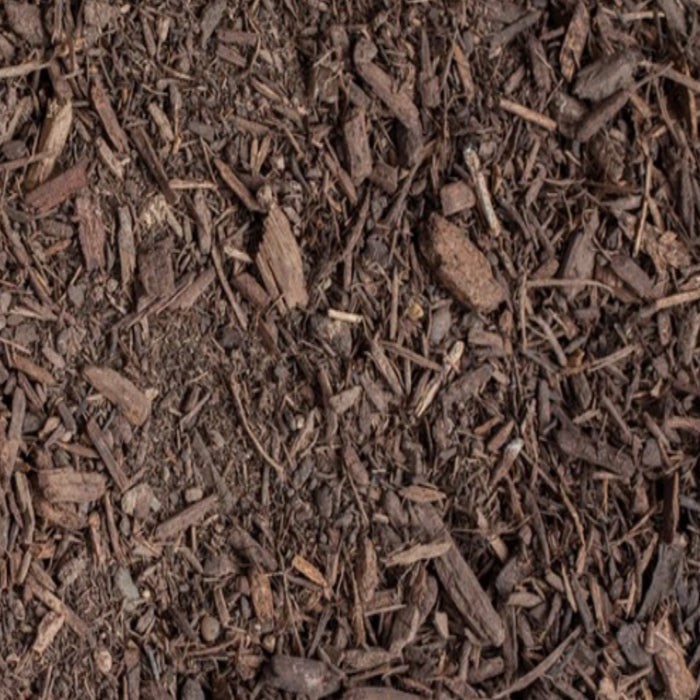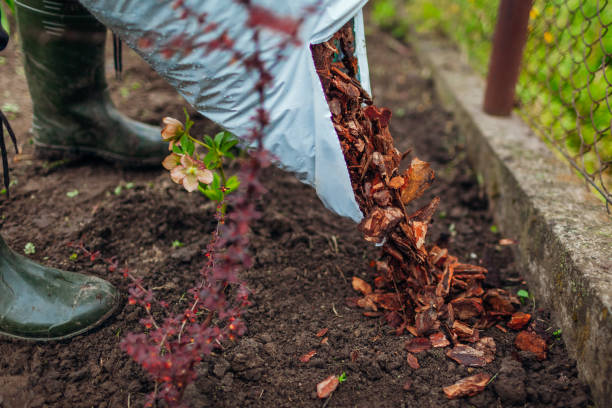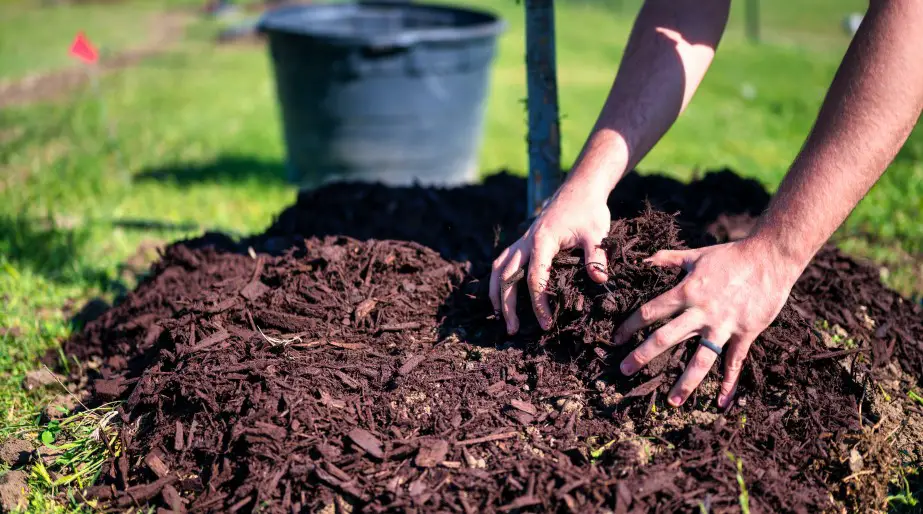Creating a beautiful and healthy garden requires more than just a green thumb; it demands the right tools and knowledge.
One key element that can make a significant difference is mulch.
Mulching not only enhances the aesthetics of your garden but also plays a crucial role in soil health, weed suppression, and moisture retention.
The two mulch types we’ll compare in this article are root mulch and hardwood mulch.
By the end of this article, you’ll be equipped with the knowledge to make an informed decision on the better mulch for your gardening needs.
Features and Benefits of Root Mulch
Root mulch, also known as organic mulch or wood chip mulch, is derived from chipped tree roots, branches, and bark.
Its coarse texture and natural composition provide numerous advantages for your garden.

Improved Soil Structure and Moisture Retention
One of the significant benefits of root mulch is its ability to enhance soil structure.
As it decomposes, it releases essential nutrients, enriching the soil and promoting healthier plant growth.
Its porous nature improves water penetration and moisture retention, preventing soil erosion and reducing the need for frequent watering.
Weed Suppression and Temperature Moderation
Root mulch acts as a protective shield against weeds by inhibiting their growth and access to sunlight.
By suffocating weed seedlings, it helps maintain a weed-free garden bed.
It also regulates soil temperature, providing insulation during extreme weather conditions and protecting the delicate root systems of plants.
Related: Hemlock vs. Pine Mulch: Which is Better?
Protection against Erosion and Soil Compaction
With its ability to minimize soil erosion caused by heavy rains or wind, root mulch acts as a natural erosion control method.
It creates a barrier that prevents soil particles from washing away and helps stabilize slopes.
Furthermore, it reduces soil compaction by absorbing the impact of heavy rainfall, preventing soil from becoming densely packed.
Features and Benefits of Hardwood Mulch
While root mulch offers a multitude of benefits, hardwood mulch presents a distinct set of advantages.
Made from shredded hardwood, including oak and maple, it’s renowned for its durability and aesthetics.

Nutrient Enrichment and Soil Amendment
Hardwood mulch provides a slow release of nutrients as it decomposes, nourishing the soil and promoting healthy plant growth.
This natural amendment enriches the soil with organic matter, improving its structure and fertility over time.
Enhanced Aesthetics and Curb Appeal
The rich, dark color and fine texture of hardwood mulch lend a sophisticated and polished appearance to any garden or landscape.
It creates a visually appealing contrast against the vibrant colors of flowers and foliage, instantly boosting curb appeal and making your garden a focal point of admiration.
Longer-Lasting Compared to Other Mulch Types
Hardwood mulch has a reputation for its longevity, making it an excellent choice for those seeking a low-maintenance option.
Due to its dense composition, hardwood mulch breaks down more slowly than other organic mulches, reducing the need for frequent replenishment.
Potential Drawbacks and Considerations
While both mulch types offer numerous benefits, it’s crucial to consider a few potential drawbacks and factors when making your selection.
Root Mulch
This may take longer to break down compared to hardwood mulch, potentially limiting the availability of nutrients to plants in the short term.
Also, some gardeners find that root mulch can attract termites or create a habitat for certain pests.
However, these concerns can be mitigated with proper application and regular inspections.
Hardwood Mulch
Although visually appealing, it may be more expensive compared to root mulch or other organic options.
It can also be challenging to find a consistent source of high-quality hardwood mulch in certain regions.
However, its durability and longevity often make it a worthwhile investment.
Related: Is Cedar Mulch Good for Fruit Trees?
Key Differences between Root Mulch and Hardwood Mulch
Understanding the distinctions between root mulch and hardwood mulch is crucial in determining the better fit for your garden.

Composition and Appearance
Root mulch is primarily made from chipped roots, branches, and bark, resulting in a coarser texture.
On the other hand, hardwood mulch consists of shredded hardwood, creating a finer and more uniform appearance.
Impacts on Soil Fertility and Plant Health
Root mulch enriches the soil with nutrients as it decomposes, benefiting plant health in the long run.
Hardwood mulch, while providing some nutrients, focuses more on enhancing soil structure and aesthetics.
Longevity and Decomposition Rates
Root mulch decomposes at a slower rate, lasting longer and requiring less frequent replenishment.
Hardwood mulch, although not as long-lasting, still offers better durability compared to other organic mulches.
Considerations for Specific Gardening or Landscaping Needs
For areas with high erosion risk or steep slopes, root mulch’s coarse texture and erosion control properties make it a suitable choice.
If you’re seeking a polished and visually pleasing appearance, hardwood mulch’s fine texture and rich color might be the ideal option.
Related: Best Mulches for Citrus Trees in Pots
Proper Application Techniques for Root Mulch and Hardwood Mulch
Both mulch options require careful application to maximize their benefits and ensure optimal results.
Root Mulch
Apply a layer of approximately 2 to 4 inches, evenly spread around the base of plants and trees.
Take care not to pile the mulch against the trunk or stems, as this can lead to moisture retention, rot, and pest issues.
Leave a small gap around the stems to prevent direct contact with the mulch.
Hardwood Mulch
When applying it, aim for a layer of 2 to 3 inches to allow for proper air circulation.
Avoid “volcano mulching,” where mulch is piled high against the trunk of trees, as it can create a breeding ground for pests and diseases.
Maintain a slight indentation around the base of trees to prevent water pooling.
Final Verdict: Choosing the Perfect Mulch for Your Garden
After exploring the features, benefits, and considerations of root mulch and hardwood mulch, you might be wondering which option is the best for your garden.
The truth is, there’s no one-size-fits-all answer.
The ideal mulch for your garden depends on various factors, including your specific gardening goals, climate, plant requirements, and personal preferences.
Choose Root Mulch If…
…you prioritize soil enrichment, erosion control, and long-lasting mulch.
Its coarse texture and ability to improve soil structure make it an excellent option for areas prone to erosion or in need of nutrient-rich soil.
The weed suppression properties and moisture retention capabilities are also noteworthy advantages.
Choose Hardwood Mulch If…
…you seek an aesthetically pleasing mulch that enhances curb appeal and provides moderate soil enrichment.
Its fine texture, rich color, and longer-lasting characteristics make it a popular choice for creating a polished and attractive garden.
It’s particularly suitable for gardens where soil fertility is already adequate or when the main focus is on visual impact.
Related
- Best Gravels to Walk on Bare Feet
- 10 Best Mulch for Wet Areas
- Top 7 Disadvantages of Decomposed Granite
- Grass Mulching Pros and Cons
- Gorilla Hair Mulch Pros and Cons
- Best Mulch for Perennials
- Where to Get Wood Chips for Gardens
- Top 10 Wholesale Mulch Suppliers
- Best Mulch for Raised Bed Vegetable Garden
- Rabbit Manure for Fruit Trees? Read This First


